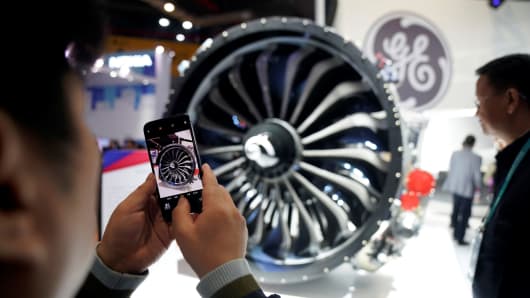
Aly Song | Reuters
A man takes a picture of a General Electric (GE) engine during the China International Import Expo (CIIE), at the National Exhibition and Convention Center in Shanghai, China November 6, 2018.
How General Electric (GE) resolves its debt problem will be "critical" to the wider Investment Grade (IG) market, an analyst said Monday.
The General Electric Company has witnessed an exodus of investment from both its equity stock and corporate debt as its future has been called into question. The U.S. behemoth has piled on the debt in recent years as it looked to buy companies, pay off its pension deficit and buy back shares.
In October, the ratings agency S&P lowered its corporate debt status from "A" to "BBB+," citing the firm's high level of debt and below-trend cash flow.
"The GE story, because it is such a massive pile of the corporate credit market and the IG market, how that plays out is kind of critical to the IG market," Bob Janjuah, Nomura's senior independent client advisor, told CNBC's "Squawk Box Europe."
Janjuah said that despite decent cash levels on an aggregate basis, a little bit of investigation reveals alarming imbalances in corporate America.
"If you break it down, you realize that the vast bulk of that cash holding is by about eight companies and that most of corporate U.S. is actually more levered than it has ever been," he added.
Total U.S. corporate debt has swelled[1] from nearly $4.9 trillion in 2007, when the global financial crisis was becoming apparent, to nearly $9.1 trillion halfway through 2018, according to Securities Industry and Financial Markets Association (SIFMA) data....

